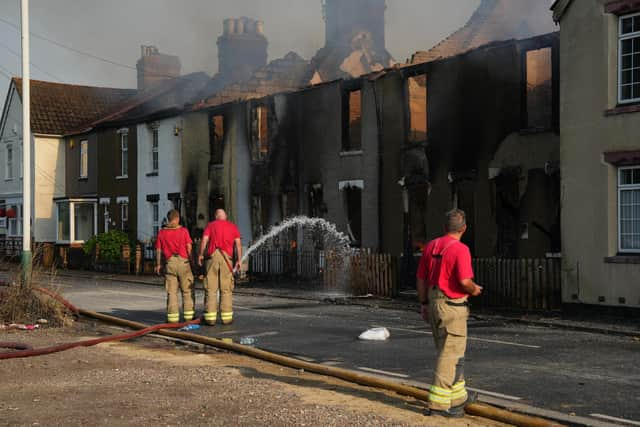Climate change: If you think 40C heatwave was bad, things are only going to get worse for next three decades until we hit net zero carbon emissions – Bob Ward
The high temperatures are likely to have killed hundreds of vulnerable people across the UK, harmed the economy by reducing productivity and damaging infrastructure, and contributed to tinderbox conditions which led to the destruction of several properties from fast-moving wildfires.
Heatwaves are becoming more frequent and intense all around the world due to climate change. It means temperature records are being broken more and more often.
Advertisement
Hide AdAdvertisement
Hide AdThe previous UK high-temperature mark was 38.7C, set in Cambridge in 2019. That was smashed on Tuesday when 39 weather stations across the UK measured higher temperatures, and Coningsby in Lincolnshire recorded an astonishing 40.3C.
The 2019 UK record was just 0.2 degrees higher than the previous high mark of 38.5C, set in Faversham, Kent, in 2003. Before that the record holder was Cheltenham, Gloucestershire, which reported 37.1C in August 1990, the first time in 79 years that the temperature had exceeded 36.7C since 1911.
Scotland’s highest ever temperature of 35.1C was also measured on Tuesday at Floors Castle in Roxburghshire, 2.2 degrees higher than the previous record set in 2003.
Professor Stephen Belcher, chief of science and technology at the Met Office, posted a video on its website in which he said: “I wasn’t expecting to see this in my career.”
Two years ago, the Met Office published research concluding that the chance of exceeding 40C was “extremely low”.


This illustrates the difficulty of forecasting how quickly the impacts of climate change will occur with greenhouse gas levels far higher than at any time in human history.
The atmospheric concentration of carbon dioxide, the most important greenhouse gas, is now 49 per cent higher than it was before the Industrial Revolution, when the world started burning fossil fuels on a large scale.
That concentration is thought to be at its highest level since the Pliocene Epoch, about three million years ago, when the global average temperature was about 2.5 to 4C warmer than pre-industrial times. At that time, the polar ice caps were much smaller and global sea level was five to 25 metres higher than today.
Advertisement
Hide AdAdvertisement
Hide AdThe terrible heatwave this week and other growing impacts we can see happening around the world is the result of a rise in global temperature of about 1.1C compared with its pre-industrial level.
Our burning of fossil fuels and destruction of forests is pushing us ever closer to a prehistoric climate. We are creating a climate that is beyond our historical records and even outside the experience of modern humans as a species.
So it is not surprising that we are finding it so difficult to forecast how quickly the impacts of climate change will develop.
Although the global average temperature is rising gradually, its consequences vary from region to region, and can be far more dramatic.
Smashing the UK temperature record this week by 1.6 degrees is shocking, but we have been seeing a similar trend in many parts of the world over the past few years.
In June 2020, the Russian town of Verkhoyansk set a new record temperature for the Arctic of 38C.
In late June 2021, the town of Lytton in British Columbia broke the temperature record for Canada on three successive days, eventually reaching a blistering 49.6C, well above the previous record of 45C. Tragically, much of the town was destroyed by a wildfire the day after the new temperature record was set.
On 11 August 2021, the town of Syracuse in Sicily, Italy, reached 48.8C, 0.8 degrees higher than the previous record for Europe.
Advertisement
Hide AdAdvertisement
Hide AdBut heatwaves are not the only extreme weather event that is becoming more frequent and intense due to climate change.
A warmer atmosphere can hold more moisture, so heavy downpours are increasing in severity. The UK’s wettest day on record occurred on 3 October 2020, when an average of 31.7 millimetres fell across the four nations.
All across the world, we are seeing flooding events caused by record rainfall levels. Coastal flooding due to storms is also increasing due to rising sea levels.
And conversely, some regions are experiencing longer and more severe periods of drought, threatening crop failure and famine.
These changes in the severity and frequency of extreme weather events are not just re-writing the record books, but are providing brutal demonstrations of how unprepared we are for the new climate we are creating.
And these impacts will continue to grow until the world stops adding to greenhouse concentrations in the atmosphere. That means reaching net-zero global emissions.
Many countries, including the UK, have now pledged to reach net-zero emissions by 2050 in order to have a reasonable chance of limiting the rise in global mean temperature to 1.5C above the pre-industrial level.
This will be very challenging, but any delay in reaching net zero will mean more warming and even bigger impacts.
Advertisement
Hide AdAdvertisement
Hide AdHowever, this also means that heatwaves, floods and other extreme weather events will continue to worsen for at least the next three decades even if we meet our emissions target.
For this reason, we have no choice but to adapt and make ourselves more resilient to extreme weather events. This will require huge investment, but the unacceptable alternative would be more suffering and harm to lives and livelihoods.
It is the price we now have to pay for being too slow to cut emissions. And it provides a stark warning of the potential cost if we delay action any further.
Bob Ward is policy and communications director at the Grantham Research Institute on Climate Change and the Environment at the London School of Economics and Political Science
Comments
Want to join the conversation? Please or to comment on this article.
